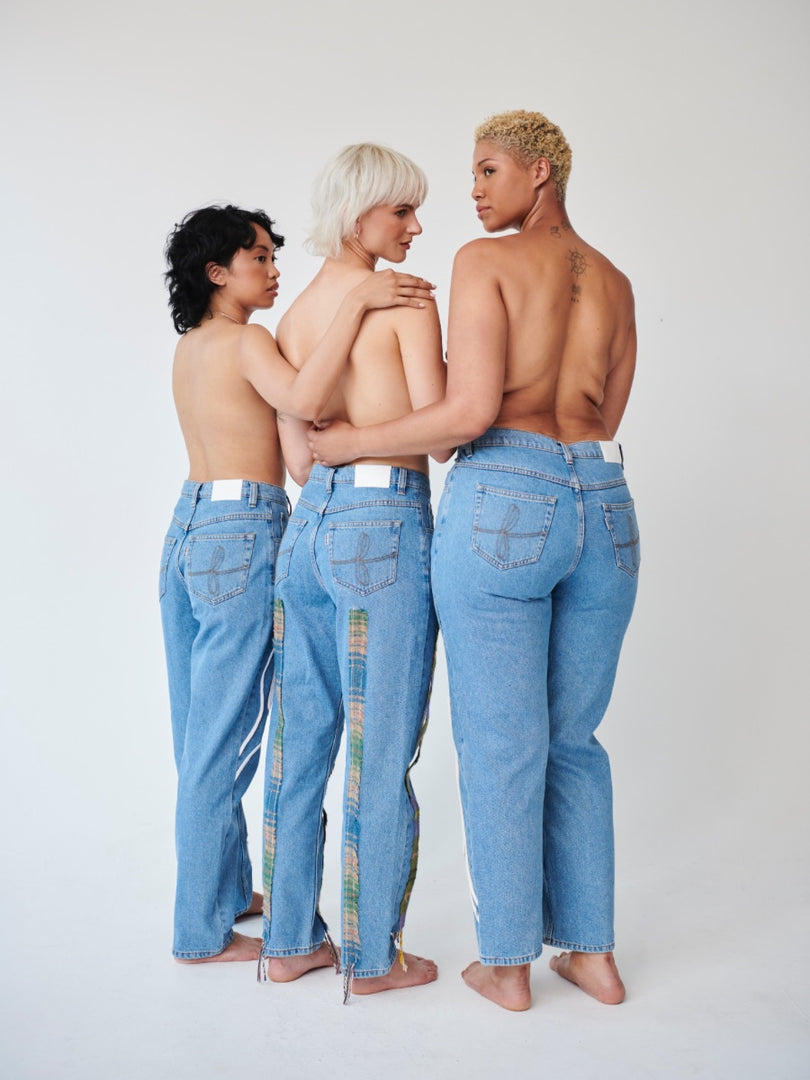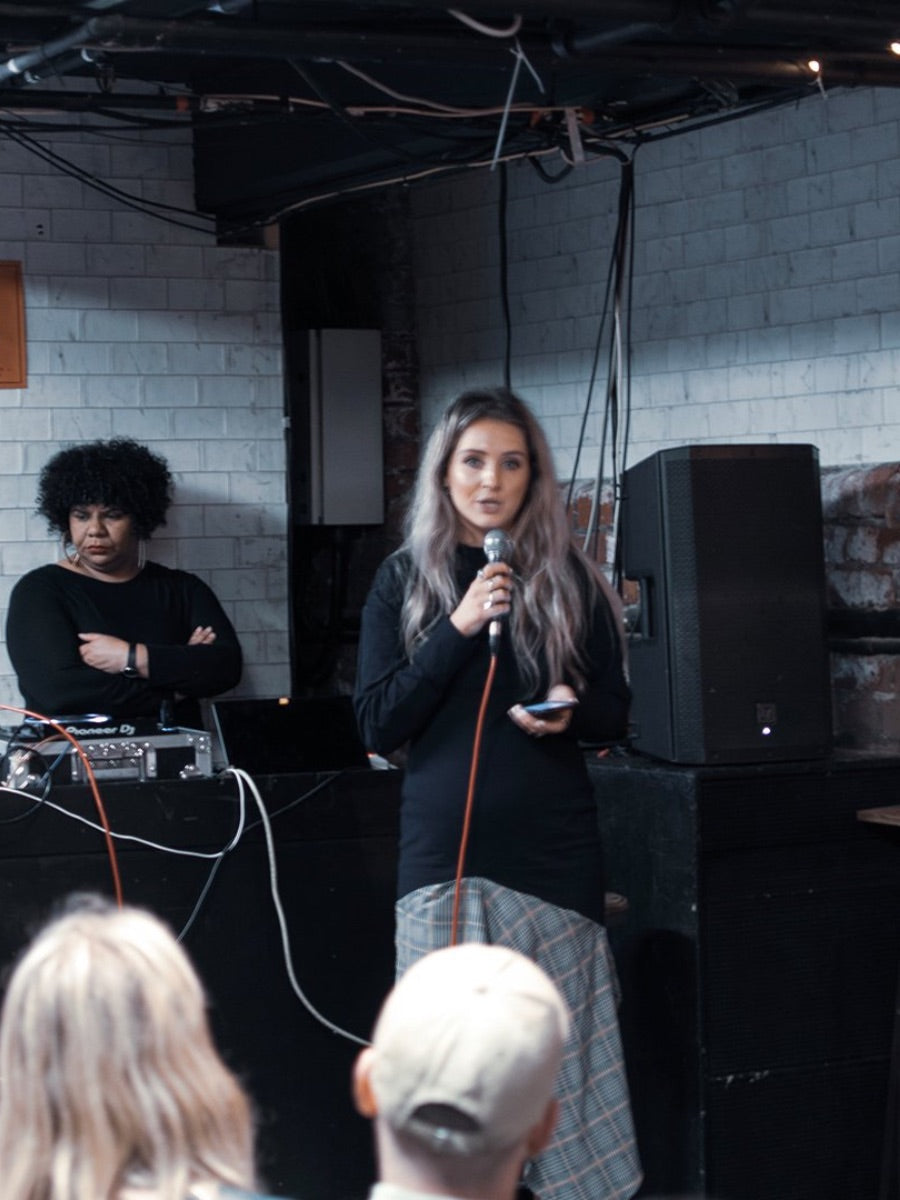Today we talk to Esther Knight the founder of Fanfare about sustainability, over the past few weeks we have been joining the fashion revolution; attending events, workshops and speaking on panels to raise awareness for ethically produced fashion. In the interview Esther discusses the issues with the current fashion model and what Fanfare are doing in order to provide an alternative.
Having been at events around the country we wanted to share with you an insight into these panels and discussions, thank you to all the event organisers for having us.

Esther, what experiences in society and in your previous work have brought you to create Fanfare?
We started the brand after seeing the issues in the industry. Fuelled by the passion to fight against human trafficking, we assist with charitable initiatives to combat exploitation and help poverty-stricken communities. I was a buyer for both designer & high street fast fashion brands and as a buyer I was the one that was dealing with and producing clothing to hit margin targets no matter what the cost was to people or the environment.
I thought that there must be a better way to do business, one where people didn’t suffer and one where clothing wasn’t promoting climate change issues.
Because after all clothing is the new plastic.
I know what responsibility I have to change what I cannot accept. Can we be the catalysts of cultural movements towards a powerful social good? Empowering to lead, levelling out the playing field and being part of the solution.
As a millennial myself that is interested in looking good and fashionable I didn’t want to buy from the high street anymore but there was no ethical shops to buy from at the time that offered contemporary clothing. I wanted trend-led, modern clothing that was authentic, unique and different to what everyone else was wearing but I couldn’t find it anywhere. Only hippy clothing or sustainable sportswear and basics.
That’s why I started Fanfare - to offer the consumer that wants electric/ design - led clothing but that also wants to shop sustainably.


Speaking of sustainability, what is the most vital element for achieving it?
A fashion brand doing a one-off sustainable collection doesn’t make a difference but when sustainability is embedded into a supply chain it is automatically embedded into the products. A 360-degree approach: social welfare, innovation and finding more sustainable ways of doing things.
It has to starts with the design process, thinking about the products you produce past the stage of them being worn. Thinking about the afterlife of garments for example not using fabrication mixes so items can be recycled easier, zero waste pattern cutting, and using techniques to use up wastage. It is about having a circular business model, that is how each designer can minimise their impact on our planet. Educating customers to buy to last and removing the idea of fast fashion.
By quality not quantity - buy wiser - clothing that you can see yourself wearing for a long time, invest more in the one-off pieces.


You said that to achieve sustainability we have to start with the design process, but what does a sustainable design depend on?
We believe in a fashion industry that values people, the environment, creativity and profit in equal measure. Now we are at the time where we can buy a dress for £5 – a price of a coffee or sandwich. We have to stop thinking that anything is disposable. Even it if cost £10 love it. So much has gone into it. So many people have worked on it. When we read on a label "made from polyester" this means the fabric has been drawn into a fibre, been spun into yarn, the yarn has been knitted into a fabric, this fabric has then been printed or dyed, then cut and sewn and you can buy all of that for £5? Including VAT – there is no value in this; then we -as consumers- do not value it.
Respecting who's make our product, that is revolutionary.
Fashion has been incredibly stupid for a long time, let's bring it back to a place of intelligence and respect.

Certainly today sustainability can be a driving force both for fashion and the economy. In your opinion, why is sustainability important for business? And for you as a brand?
This expanding world has given rise to fast fashion, where companies are mass-producing their pieces in order to offer low prices and keep up with ever-changing trends. These sort of brands are contributing to massive amounts of waste within the fashion industry. Fast fashion is leading to global exploitation. Contributing to the 36 million people living in modern slavery, with migrant workers, and the most venerable being, forced into labour.
The short product life cycles, the use of non-recyclable textiles leads to the clothing industry being the second largest polluter in the world. For too long businesses have built supply chains to drive financial profits at the expense of people and the environment. Systematic exploitation remains rife, basic H&S measures do not exist, millions of workers live in poverty and with excessive hours, unpaid overtime, poor health, exhaustion, sexual harassment and slavery, practices need to change.
Children are working instead of going to school, workers cannot provide for their families and 300,000 cotton farmers commit suicide each year. Not to mention the environment - 1.7 billion tonnes of carbon dioxide is emitted annually and 2.1 billion tonnes of waste is produced each year. 2 million tonnes of clothing and textiles are thrown away each year in the UK and 80% of textile waste goes to landfills which could actually have been reused.
Doing business as usual will not be an option anymore.



If it is true that sustainability represents a possibility of growth, is it also true that it presents some challenges? In your work, what are the challenges you are facing to achieve sustainability?
We are a startup brand so the biggest challenges we face is professionally vetting, and checking the factories and suppliers we use. We do not have a huge budget to officially validate these suppliers, therefore what we have to do is approach companies that hold certifications and non profit organisations to do this for us. This again is expensive but it is important. In this way I know all suppliers have been vetted and have had to reach the standards in order to be awarded the Cruelty-Free, Fair Trade and GOT certified organic cotton certifications.


How do you see the future of fashion?
The future has to be sustainable - there is no other way.
Fashion is actually a really distinctive part of all of our lives. Each of us, each day makes a decision about what we're going to wear, both what it looks like and what we do with it. And on another level, it is a really important industry. So from a government and business perspective, it has a huge contribution to economies around the world.
In fact, up to $3 trillion worth of fashion is circulated around the world each year. And this employs 50 million people, mainly women, across different parts of the world from the production, the design, the selling, and the servicing of clothes. So it has a huge infrastructure. Every item in our wardrobes comes directly from nature. We don't always think about this, but every element of each of our garments comes through the processes that come out of the ground. So fashion actually is a way of connecting us back to where we come from where we live and it's also something that we can each potentially affect.
I was actually implicated in a really toxic mix of human and ecological destruction. So as a designer, I set out to do good. I had to really understand what the implications of my work were, and really how I could redefine good design.








